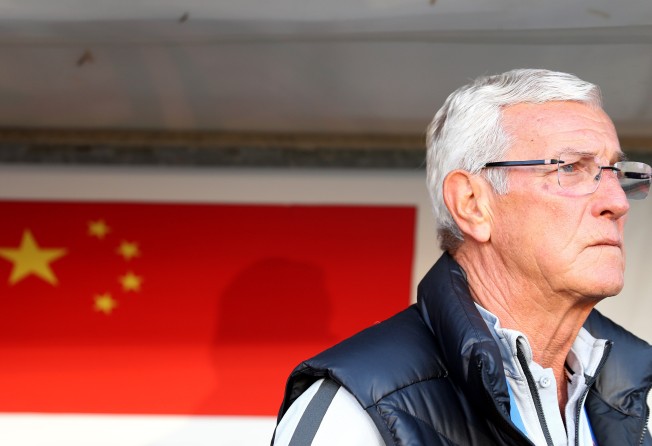In the pre-match conference, Marcello Lippi revealed that Wu Lei will rest in the match tomorrow against South Korea but will play in the knockout stage. In the video screening the training revealed by Chinese state television, Wu Lei's shoulder clearly protruded. pic.twitter.com/oqK6XXRRfa
— Titan Sports Plus (@titan_plus) January 15, 2019
Asian Cup: Marcello Lippi is right – Chinese football’s problems are striking, but maybe there’s hope for the future
- Wu Lei tops Chinese Super League goal charts but was notable exception on list dominated by imports
- Shanghai SIPG star set to miss South Korea clash at Asian Cup with shoulder injury

When it comes to Chinese football the problem is striking. Head coach Marcello Lippi said as much ahead of their Asian Cup game against the Philippines.
He was worried that Wu Lei, last season’s Chinese Super League top scorer, might not play because of a shoulder injury.
In the end the Shanghai SIPG forward played anyway, scoring twice and securing China’s passage through to the round of 16.
Images of his collarbone and the X-ray of the injury that have circulated since look like he did well to play let alone score two top-drawer goals.
But he will now sit out the South Korea decider, and the absence of their missing superstar – and the possibility of facing Spurs forward Son Heung-min – is likely to provide another reminder of how far Chinese football still has to go compared to its neighbours and regional rivals.
Beijing Guoan’s Yu Dabao scored the other goal in the win over the Philippines. His header just 14.5 seconds after coming on as a substitute showed a poacher’s instinct, just as his winner against Kyrgyzstan showed composure.
Not bad assets for a man who played last season as an auxiliary central defender for his club.
While Wu scored 27 goals in 29 CSL games, Yu managed just two. That total was matched by clubmate Wei Shihao, one of China’s five nominal forwards at the Asian Cup, while Guanghzou Evergrande’s Gao Lin hit double figures and Guangzhou R&F’s Xiao Zhi bagged seven.
Of these five only Wu (27) and Wei (23) are under 30. Gao will be 33 before the new season starts.
It’s not like there is massive depth for Lippi to call upon. A look at the scoring charts makes for quick reading if you’re looking for Chinese players.
After Wu, the next highest scoring domestic player is Dong Xuesheng on 12, his most prolific season, before Gao on 10. There are 15 foreigners between Wu and Dong, and another eight to Gao.
14.5 seconds is all it took for Yu Dabao to net China PR’s 3rd goal against the Philippines #AsianCup2019 pic.twitter.com/mKANGPRF7C
— #AsianCup2019 (@afcasiancup) 12 January 2019
Below that, Yang Xu at Tianjin Quanjian got nine, Lu Wenjun at SIPG matched Xiao’s seven but like Dong they are not part of the national set up.
Further down three Chinese players scored six, three more scored five and five scored four goals – all were midfielders but for sometime Shanghai Shenhua striker Zhu Jianrong.
Nine got three goals, 23 got two goals and 70 scored a single league goal last season to make a total 117 of 186 scorers Chinese.
In the pre-match conference, Marcello Lippi revealed that Wu Lei will rest in the match tomorrow against South Korea but will play in the knockout stage. In the video screening the training revealed by Chinese state television, Wu Lei's shoulder clearly protruded. pic.twitter.com/oqK6XXRRfa
— Titan Sports Plus (@titan_plus) January 15, 2019
That’s just shy of 63 per cent in a league where the squads can have no more than four foreigners and only play three of them. Moreover, the foreigners skew higher scorers accounting for almost 65 per cent (495) of the 753 non-own goals scored.
Worryingly the Chinese attackers who had their best seasons in front of goal like Dong, Yang and Lu are aged around 30.
Even accounting for the fact that before the under-23 rule came into play Chinese players have tended to only become first-team regulars in their late 20s, that doesn’t make for a bright future.
Korea Republic star Son Heung-min arrives in the UAE for the #AsianCup2019! pic.twitter.com/oFJl83vft3
— #AsianCup2019 (@afcasiancup) 14 January 2019
“There are too many overseas strikers,” Lippi said of the dearth of Chinese forwards in a league where clubs put the goalscoring burden on their expensively-assembled foreign quota.
Lippi is a smart man – he’s won a World Cup and the Champions League on two continents but while he is correct the irony of him saying that has not gone unnoticed. He relied on Muriqui and Lucas Barrios when he arrived at Guangzhou Evergrande, when the pair’s goals helped him win the league and Chinese FA Cup.
In his first winter transfer window Lippi bought Elkeson, who fired the club to the 2013 AFC Champions League – set up in the second leg of the final by Muriqui who had scored a record 13 goals along the way. Elkeson went on to hit the CSL season record of 28 in 2014 as Lippi’s side won the league again. He continued with attacking imports in countrymen Allesandro Diamanti and Alberto Gilardino.
Arguably Lippi is doing similar in taking a job away from a Chinese coach, something that could be equally stunting to the game’s long-term development.
Then again, like the foreign forwards, the Italian is just a pawn in the Chinese model of employing foreign experts until domestic talent is ready to step up.
Maybe that could be sooner than we think with the arrival of naturalised footballers with Chinese ancestry.
Former Arsenal prospect Nico Yennaris is reportedly in Beijing ahead of picking up a Chinese passport and signing for Beijing Guoan. While the Brentford midfielder is likely not the answer to a striking crisis, the doors his arrival opens could push things forward for whoever follows Lippi in the hot seat.